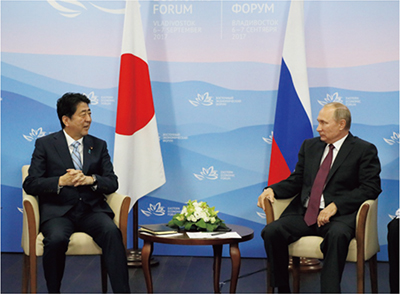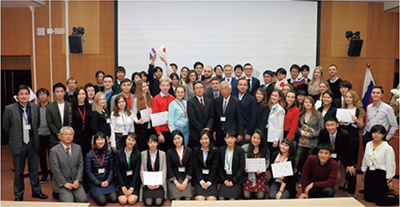Diplomatic Bluebook 2018
Chapter 2
Japan's Foreign Policy that Takes a Panoramic Perspective of the World Map
1 Russia
(1)Situation of Russia
A Internal Situation in Russia
After receiving the overwhelming support of public opinion after the “annexation” of Crimea in March 2014, President Putin maintained a high approval rate throughout the entire year of 2017. On the other hand, Prime Minister Medvedev's corruption scandal caused large-scale protests in March, while anti-government protests led by the opposition parties were held in June and October.
B Russian Economy
The Russian economy saw sluggish growth since the second half of 2014 due to the fall in international oil prices and economic sanctions by the European countries and the U.S. But the downturn came to a stop with the stabilization of oil prices in 2016, and the country's GDP growth rate improved to minus 0.2%. In 2017, the GDP growth rate bounced back to +1.5% (preliminary estimate) amid further improvement in consumption and investment, as well as weaker inflation and increased wages, indicating a trend of recovery. However, some factors for instability remain, including real incomes still showing negative growth.
C Russian Diplomacy
Russia, and the European countries and the U.S. remained in confrontation because of the Ukrainian situation as well as suspicions that Russia interfered with the U.S. election. Relations between Russia and the U.S. have not showed signs of improvement, evident by the exchanges of retaliatory measures against each other.
Russia maintains close ties with China, working for connecting the Eurasian Economic Union (EAEU) with the “Belt and Road” Initiatives, as well as implementing two joint military exercises.
In the Middle East, Russia has engaged in diplomacy using its unique position in conducting dialogues with various countries within the region. In particular, in Syria, President Putin ordered Russian troops dispatched to the country to begin withdrawing in December, while promoting a political dialogue process as well as cooperating with Iraq and Turkey.
Also, Russia has maintained a traditional cooperative relationship with the CIS (Commonwealth of Independent States), while exercising diplomacy via multinational frameworks including the BRICS (Brazil, Russia, India, China and South Africa) and the Shanghai Cooperation Organization (SCO).
(2) Japan-Russia Relations
A Japan-Russia Relations in the Asia-Pacific Region
In recent years, Russia places importance on the development of the Russian Far East and the East Siberia and has been proactively enhancing relations with the states in the Asia-Pacific region that is a center of the growth of the global economy. The development of the relations with Russia as a partner in the Asia-Pacific region contributes not only to Japan's national interests but also to peace and prosperity of the region. Japan and Russia have developed cooperative relations in various fields including politics, security, economy, culture and people-to-people exchange.
On the other hand, the greatest concern between Japan and Russia is the Northern Territories Issue. Holding frequent dialogues between the two leaders and Foreign Ministers, the Government of Japan has been energetically continuing negotiations with Russia to conclude a peace treaty through the resolution of the issue of the attribution of the Four Islands.
B The Northern Territories and Negotiations for Conclusion of a Peace Treaty
The Northern Territories Issue is the greatest concern between Japan and Russia. Japan's position is that the Four Northern Islands belong to Japan. The Government of Japan has been energetically continuing negotiations with Russia under its consistent basic policy of concluding a peace treaty with Russia through the resolution of the issue of the attribution of the Four Northern Islands on the basis of the agreements and documents created by the two sides so far, such as the Japan-Soviet Joint Declaration of 1956, the Tokyo Declaration of 1993, the Irkutsk Statement of 2001, and on the principles of law and justice3.
In 2017, during active political dialogues, including four Summit Meetings and five Foreign Ministers' Meetings, the matters agreed4 between the two leaders on the occasion of President Putin's visit to Japan at the end of 2016 have been taking shape. Regarding the Joint economic activities on the Four Northern Islands, following the Foreign Ministers Meetings in February and March as a result of the Japan-Russia Summit Meeting held in Moscow at the end of April, the two countries agreed to send a joint public and private research team to the Four Northern Islands, and the first field survey on the islands was conducted in June. Following the Japan-Russia Summit Meeting held during the G20 Hamburg Summit (Germany) in July, and the first Foreign Ministers' Meetings since Foreign Minister Kono took office in August (Manila, the Philippines), the Japan-Russia Summit Meeting was held in Vladivostok in September, and as a result, the five candidate projects5 were designated, while both countries shared the view that they will explore legal frameworks that do not harm the positions of either side and will start from those which are viable. Subsequently, following the Foreign Ministers' Meeting on the occasion of the UN General Assembly in September, the second field survey on the Four Northern Islands was concluded in October. In the Japan-Russia Summit Meeting held during the Vietnam APEC Summit Meeting, the two leaders agreed to accelerate consideration in order to give shape to the candidate projects towards the spring of 2018. Furthermore, specific way of further work was confirmed at the Foreign Ministers' Meeting upon Foreign Minister Kono's visit to Russia at the end of November.
In addition, as a part of humanitarian measures for the former island residents of the Northern Territories, a grave visit to Seseki area of Kunashiri Island to which access had been restricted was realized in August. Also in August, an additional entry/exit point was set up for the grave visits to Habomai Islands. Furthermore, in September, a special grave visit by airplane was conducted for the first time, opening up a new path to reducing the physical burden of the former island residents. Japan and Russia have agreed to take further measures in order for the island residents to be able to visit the islands more freely in 2018 and beyond.
 State Minister for Foreign Affairs Nakane accompanying the special grave visit to the Northern Territories of the former island residents by airplane (September 24, left: Nakashibetsu Airport, right: Furukamappu Cemetery)
State Minister for Foreign Affairs Nakane accompanying the special grave visit to the Northern Territories of the former island residents by airplane (September 24, left: Nakashibetsu Airport, right: Furukamappu Cemetery)To realize the conclusion of a peace treaty based on a future-oriented approach of identifying solutions acceptable for both parties through jointly developing a future vision of the Four Northern Islands, the Government of Japan will continue to work to give shape to the matters agreed between the leaders of Japan and Russia under their strong leadership.
The Government of Japan is actively working on projects contributing to the improvement of the atmosphere for the resolution of the Northern Territories Issue, such as the four-island exchange program, Free visits, Visits to graves, and cooperation such as disaster prevention in adjacent areas. The Government of Japan is approaching and coordinating with the Russian side in order to ensure safe operations for Japanese fishing vessels in the waters surrounding the Four Northern Islands and to continue the fishing of salmon and trout using an alternative fishing method to the prohibited driftnet fishing. However, Russia's moves to build up military forces in the Four Northern Islands are contradictory to the Government of Japan's position regarding the Northern Territories Issue, and Japan is taking appropriate action against Russia.
 Departure ceremony for the special grave visit by airplane (September 24, Nakashibetsu Airport)
Departure ceremony for the special grave visit by airplane (September 24, Nakashibetsu Airport)- 3 Way back when the Soviet Union continued denying the presence of a territorial issue itself, Foreign Minister Masayoshi Ohira proposed to refer the Northern Territories Issue to the International Court of Justice in October 1972, which Foreign Minister Gromyko of the Soviet Union turned down. At present, the Russian side admits the necessity to conclude a peace pact through bilateral negotiations with Japan, engaging in negotiations for the solution of the issue.
- 4 2-5 See footnote 2 of the Overview
- 5 2-5 See footnote 1 of the Overview
C Japan-Russia Economic Relations
Japan-Russia trade volume in 2017 increased for the first time in four years since 2013, amid the stabilization of oil and natural gas prices, major commodities imported to Japan from Russia, and an increase in the amount of automotive components exported from Japan to Russia (trade volume amounted to about 2.2224 trillion yen, marking an increase of about 25% over the previous year) (Source: Trade Statistics of Japan, Ministry of Finance).
On the other hand, the volume of Japanese direct investment to Russia fell from 217.6 billion yen (2015) to 175.7 billion yen (2016) (Source: Balance of Payments Statistics of the Bank of Japan).
With regard to the Eight-point Cooperation Plan for Innovative Reform in the field of Industry and Economy of Russia as a leading country of a favorable living environment6 proposed by Prime Minister Abe in May 2016, Prime Minister Abe presented the benefits of the Cooperation Plan to President Putin using audio and visual materials, and the two leaders agreed to further realize the plan during Prime Minister Abe's visit to Moscow in April 2017. Minister of Economy, Trade and Industry, and Minister for Economic Cooperation with Russia Hiroshige Seko attended the St. Petersburg International Economic Forum in June and the International Industrial Trade Fair INNOPROM (Yekaterinburg) in July, where active discussions took place between Japanese and Russian companies. Through the above-mentioned efforts, at the 3rd Eastern Economic Forum (Vladivostok) in September a wide range of results were accomplished, including the signing of the amended Tax Convention between Japan and Russia, the establishment of a joint investment framework between the Japan Bank for International Cooperation (JBIC) and the Russian Direct Investment Fund (RDIF), and the signing of a memorandum on cooperation toward realizing a digital economy. Ever since President Putin's visit to Japan in December 2016, 100 documents have been concluded between private-sector companies in both countries.
 Japan-Russia Summit Meeting (September 9, Vladivostok; Photo: Cabinet Public Relations Office)
Japan-Russia Summit Meeting (September 9, Vladivostok; Photo: Cabinet Public Relations Office)During the Japan-Russia Summit Meeting held at the APEC Economic Leaders' Meeting in Vietnam in November, both leaders welcomed progress in the realization of the Cooperation Plan and reaffirmed that discussions will continue to be held. At the 13th Meeting of the Japan-Russia Intergovernmental Committee on Trade and Economic Issues (Moscow) held in the same month, Foreign Minister Kono and First Deputy Prime Minister Shuvalov agreed to promptly implement domestic procedures for the early entry into force of the Tax Convention between Japan and Russia. With regard to cooperation in the Far East region, Japan proposed cooperation focused on (1) development of agriculture, forestry and fisheries industries; (2) infrastructure development for the promotion of the role of the region as export hubs; (3) energy development; and (4) establishing a foundation for investment promotion. Minister of Economy, Trade and Industry and Minister for Economic Cooperation with Russia Seko and representatives from Japanese companies took part in Japanese Investor Day (Vladivostok) held in December, where discussions were held on further energizing cooperation in the Far East region.
Furthermore, Japan Centers operating in six cities in Russia carry out business matching between companies from both countries and hold management courses. To date, a total of some 82,000 Russian people have taken the courses and about 5,100 of them have visited Japan for training.
- 6 Proposed by Prime Minister Abe at the Japan-Russia Summit Meeting held in Sochi, Russia, to which President Putin expressed positive feedback and approval. The eight items are: (1) extending healthy-life expectancy, (2) development of comfortable and clean cities easy to reside and live in , (3) fundamental expansion of exchange and cooperation among medium-sized and small companies, (4) energy, (5)promotion of industrial diversification and enhancement of productivity in Russia, (6) development of industries and promotion of the role as export bases in the Far East, (7)cooperation on cutting-edge technologies, and (8) fundamental expansion of people-to-people interaction.
D Cooperation between Japan and Russia in Various Fields
(A) Defense Exchanges, Security and Maritime Security
In 2017, discussions such as Japan-Russia Strategic Dialogue were held between diplomatic authorities from the two countries in a wide range of areas including disarmament, non-proliferation, consular services, etc. Practical training for drug enforcement agents from Afghanistan and Central Asia was also implemented by officers from Japan and Russia. The two countries also agreed to engage in new cooperation to tackle terrorism, drugs, money laundering, and corruption, and one foreign ministry official was dispatched to the United Nations Office on Drugs and Crime (UNODC).
In the area of security, the Japan-Russia Foreign and Defense Ministerial Consultation (“2+2”) took place in Tokyo in March for the first time in three years and four months and Japan-Russia security talks between Foreign Ministries took place in August. Also, Secretary General Shotaro Yachi of the National Security Secretariat met with Secretary of the Security Council Patrushev in September and December. Regarding defense exchanges, Colonel General Salyukov, Commander-in-Chief of the Land Forces of Russia visited Japan in November and General Gerasimov, Chief of the General Staff of the Armed Forces of Russia visited in December. At the working level, the two countries endeavored to encourage mutual understanding and prevent chance accidents by continuously implementing a range of consultations and a Japan-Russia Search and Rescue Exercise. Moreover, a joint exercise was held involving patrol vessels of the Japan Coast Guard and Russian security forces vessels, and collaboration was confirmed in the area of security in marine transportation. In July, Admiral Satoshi Nakajima, Commandant of the Japan Coast Guard, visited Russia where talks involving the heads of both countries' maritime security agencies were held for the first time in about four years.
(B) Human and Cultural Exchanges
Following confirmation at the Japan-Russia Summit Meeting of December 2016 that youth exchanges will be doubled, in 2017 a total of 1,118 people (2.3 times the number of the previous year) participated in the Japan-Russia Youth Exchange Program, where exchanges took place in a broad range of areas.
Additionally, cultural exchanges became more active as various Japanese cultural events were held across Russia and Japan hosted its world-first “Russian Seasons.” Furthermore, at the Japan-Russia Summit Meeting (Vladivostok) held in September 2017, an agreement was reached to hold the opening ceremony for Japan Year in Russia and Russia Year in Japan on May 26, 2018 in Moscow.
 Japan-Russia Youth Forum 2017 (November 20, Hokkaido; Photo: Japan-Russia Youth Exchange Center)
Japan-Russia Youth Forum 2017 (November 20, Hokkaido; Photo: Japan-Russia Youth Exchange Center)